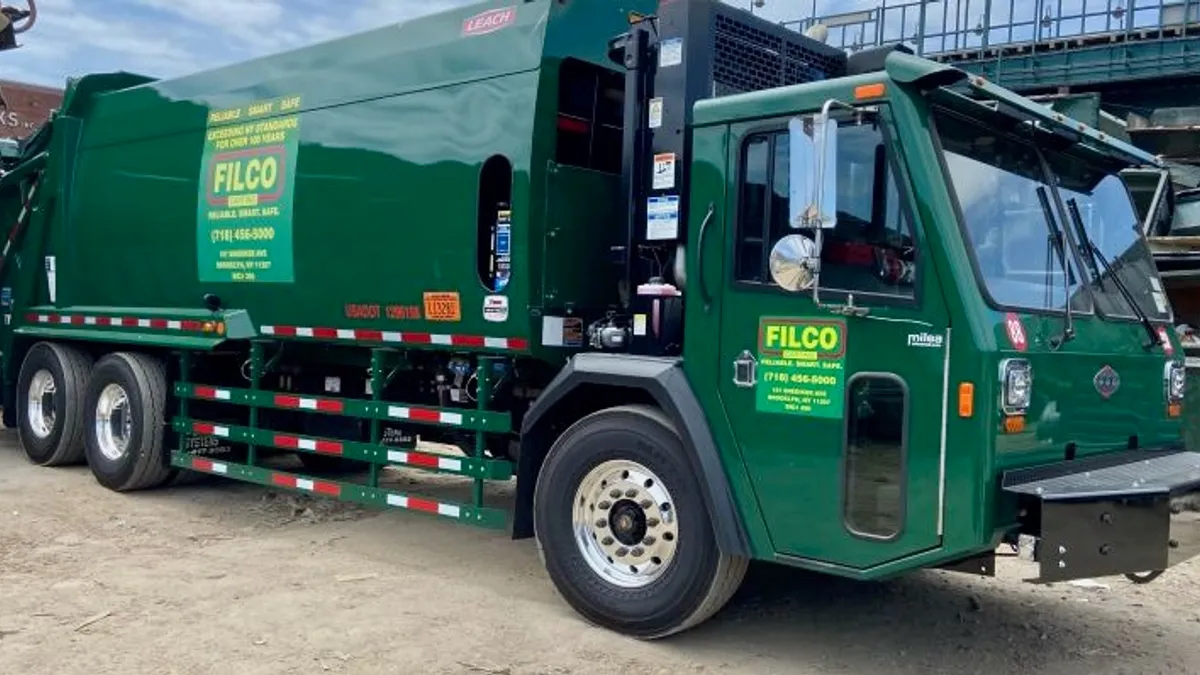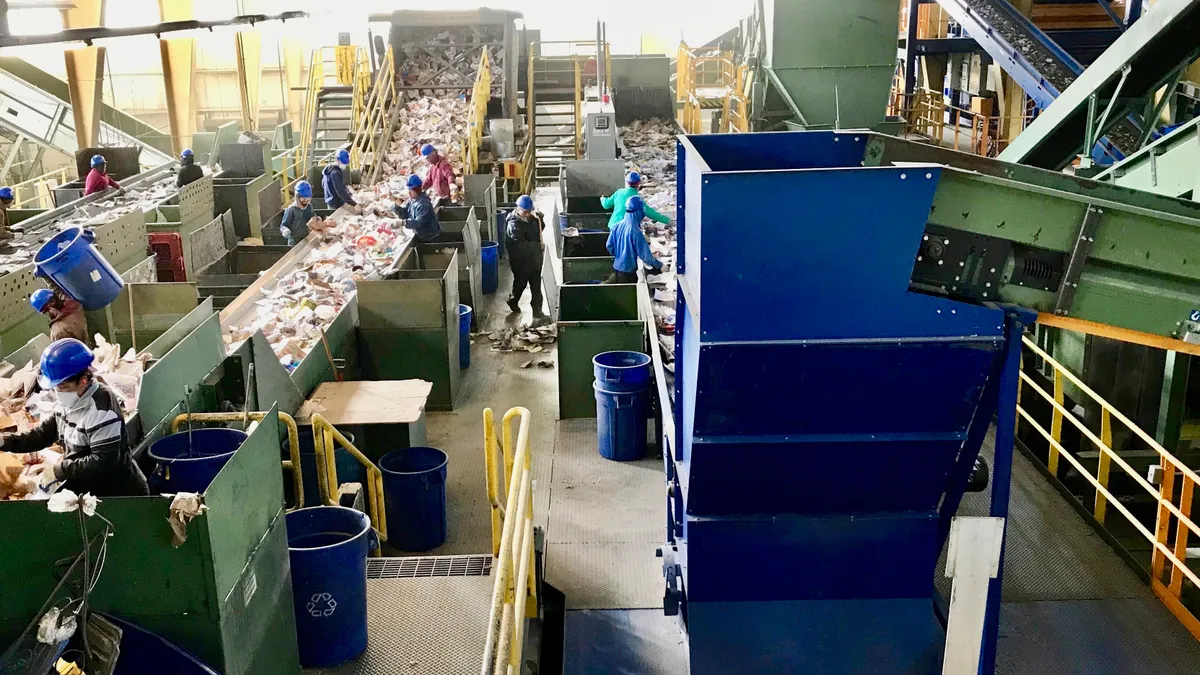The U.S. EPA's recently proposed FY21 budget calls for a nearly 53% reduction in funding dedicated to the agency's waste minimization and recycling work, despite ongoing public promises to help address national recycling challenges.
As outlined, the annual budget for this area under the Resource Conservation and Recovery Act (RCRA) would decline by nearly $9 million and be offset by $4.25 million in new initiatives. Staffing levels would shrink from 43.4 full-time equivalent (FTE) staff to 5 FTE. The EPA says its proposal "refocuses the Program from efforts in Sustainable Materials Management to the priority areas of recycling and food waste and loss."
The Trump administration has sought to drastically reduce the EPA's budget before, but is annually rebuffed by Congress. House Speaker Nancy Pelosi already indicated the administration's new broader budget proposal will face a similar reaction this year.
The FY21 proposal also includes a large reduction to related RCRA waste management work, but the requested recycling cuts are in some ways more notable when it comes to agency messaging. For the past three budget years (FY18, FY19 and FY20), the EPA has proposed a complete elimination of the RCRA waste minimization and recycling program.
Traditionally, EPA has justified the cuts by arguing state and local governments could continue similar work, even though many other environmental agencies face their own funding constraints. This year the agency altered that approach, indicating EPA wants to more generally shift resources away from sustainable materials management (SMM) projects.
SMM, a lifecycle thinking concept elevated within the EPA's Office of Land and Emergency Management (OLEM) during the Obama administration, is often raised by both appointees and career staff as a foundational element of their work. SMM was most recently cited as a priority to Waste Dive last fall by EPA officials and mentioned by OLEM Assistant Administrator Peter Wright in a House subcommittee hearing just last week.
Asked to explain this implied policy shift, an EPA spokesperson told Waste Dive the agency's position has not changed. They pointed to upcoming events around SMM and ongoing planning for 2020 America Recycles Week activities. "The Administration’s 2021 budget request marks a significant commitment to this priority area by requesting more funding than last year’s request," the spokesperson said via email.
While the agency's $4.25 million request for new initiatives is notable – especially when compared to last year's request for fully eliminating the program with no offset funding – it is still a significant reduction when balanced out by the nearly $9 million in proposed cuts.
This new approach may be partially influenced by public and industry pressure around recycling market issues. When asked last fall why the agency had chosen to get more involved with America Recycles events in 2018 and 2019, after prior budget cut efforts, Administrator Andrew Wheeler told Waste Dive that China's scrap import restrictions were a factor.
The agency's newly requested $4.25 million covers initiatives in that vein.
A $2.2 million recycling needs assessment, which would include the development of new metrics to assess areas such as performance and infrastructure financing, would be used to influence development of an upcoming national strategy. Another $1.52 million would go to two new grant programs. One would focus on food waste reduction and the other would establish a Community Recycling Infrastructure and Capacity Building Grant to aid local governments. Another $508,000 is for a pilot program to "encourage creation of products made with recycled content and increased use of recycled materials in manufacturing."
Much of this aligns closely with related proposals for federal recycling legislation and requests by many in the industry, but EPA leadership's proposal to cut funding for its more foundational work is sparking pushback and raising some questions.
"The way in which we manufacture and dispose of everything we produce has enormous impacts on the amount of energy we use, as well as the carbon emissions and water and air pollution we produce. So the Administration’s purported focus on one slice of the waste issue is no reason to step away from the broader set of challenges," Eric Goldstein, a senior attorney with the Natural Resources Defense Council, told Waste Dive via email after a preliminary review of the budget. "Once again, the Administration is proposing cuts that would decimate needed EPA programs. And once again, it will be necessary for Congress to step in and restore funding[.]"
When asked for comment, groups that partnered with the EPA on last year's America Recycles events did not express notable concern the proposal would come to fruition.
“We are at a critical point where communities, brands, manufacturers, the recycling industry, and others are working together to develop solutions to the challenges facing the residential recycling stream. The EPA has been an important leader in bringing together the many different stakeholders," said Billy Johnson, chief lobbyist for the Institute of Scrap Recycling Industries, citing multiple programs in a statement. "To continue this trend and continue with this momentum, it is important that the EPA has the resources it needs to fulfill its mission."
"It is unclear at this preliminary stage what impact, if any, the proposed FY 2021 EPA budget may have on the Agency’s work relating to America Recycles Day and implementation of the Framework," said Solid Waste Association of North America CEO David Biderman in a statement, citing his organization's plans to keep working with the agency to "support strong recycling systems in communities throughout the United States."
The Recycling Partnership and Keep America Beautiful declined to comment, citing time constraints.
Given that SMM research is still mentioned in another area of the EPA's budget, it remains to be seen if or how the Trump administration's desire to reduce the agency's size would have any lasting effects on waste policy. The EPA's spokesperson noted that final decisions "will be made at a later date, after Congressional appropriations are made."
Given the heightened interest in recycling issues so far this year, and the Trump administration's unsuccessful efforts to reduce similar funds in prior years, the likelihood of these cuts is far from certain.

















